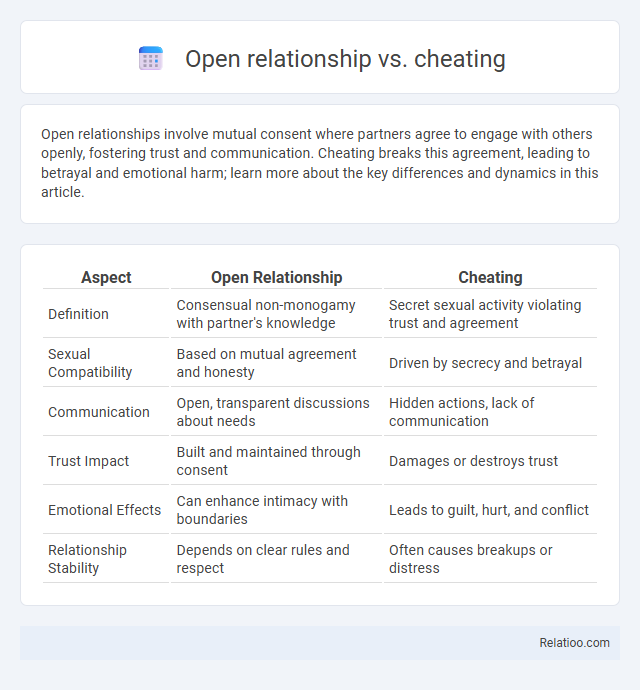Open relationships involve mutual consent where partners agree to engage with others openly, fostering trust and communication. Cheating breaks this agreement, leading to betrayal and emotional harm; learn more about the key differences and dynamics in this article.
Table of Comparison
| Aspect | Open Relationship | Cheating |
|---|---|---|
| Definition | Consensual non-monogamy with partner's knowledge | Secret sexual activity violating trust and agreement |
| Sexual Compatibility | Based on mutual agreement and honesty | Driven by secrecy and betrayal |
| Communication | Open, transparent discussions about needs | Hidden actions, lack of communication |
| Trust Impact | Built and maintained through consent | Damages or destroys trust |
| Emotional Effects | Can enhance intimacy with boundaries | Leads to guilt, hurt, and conflict |
| Relationship Stability | Depends on clear rules and respect | Often causes breakups or distress |
Understanding Open Relationships
Open relationships involve consensual agreements where partners openly engage with others, emphasizing communication, trust, and boundaries to maintain emotional security. Cheating breaks these agreed-upon boundaries, involving secrecy and betrayal that undermine the foundation of trust. Understanding open relationships requires recognizing the importance of transparency and mutual consent in fostering healthy, non-monogamous connections.
Defining Cheating in Modern Relationships
Cheating in modern relationships is typically defined as violating the agreed-upon boundaries of exclusivity, consent, and trust between partners. Unlike open relationships, where all parties explicitly consent to non-monogamy, cheating involves deception and betrayal, undermining the foundation of honesty essential to healthy connections. Understanding these distinctions helps you navigate relationship expectations and maintain mutual respect.
Key Differences Between Open Relationships and Cheating
Open relationships involve mutual consent and clear communication between partners, allowing romantic or sexual interactions with others, whereas cheating occurs when one partner violates agreed-upon boundaries without consent. Trust, honesty, and transparency are foundational in open relationships but absent in cheating, which often leads to emotional harm and breach of trust. The key difference lies in consent and agreement, making open relationships a negotiated lifestyle choice while cheating is a breach of commitment.
Communication: The Foundation of Open Relationships
Open relationships rely fundamentally on transparent and ongoing communication to establish trust and mutual understanding between partners. Unlike cheating, where secrecy and deception undermine the relationship's integrity, open relationships emphasize setting clear boundaries and openly discussing desires and expectations. Effective communication acts as the foundation that differentiates ethical non-monogamy from infidelity, ensuring all parties feel respected and valued.
Trust and Transparency in Relationship Dynamics
Open relationships rely heavily on trust and transparency, allowing partners to set clear boundaries and openly communicate desires and concerns. Cheating breaks this foundational trust by introducing secrecy and deception, undermining the relationship's integrity and emotional security. Transparent communication in open relationships fosters mutual respect and strengthens the bond, distinguishing it fundamentally from the betrayal inherent in cheating.
Emotional Impact: Open Relationships vs. Cheating
Open relationships emphasize mutual consent and transparency, which significantly reduce feelings of betrayal and emotional distress compared to cheating. Cheating involves deception and broken trust, often leading to intense emotional pain, anxiety, and relationship instability. Emotional impact in open relationships tends to include increased communication and emotional growth, whereas cheating frequently results in long-lasting trust issues and emotional trauma.
Setting Boundaries: Agreements vs. Betrayal
Setting boundaries in an open relationship involves clear, consensual agreements that define acceptable behaviors and emotional limits, fostering trust and transparency between partners. Cheating, by contrast, constitutes a betrayal of agreed-upon terms, undermining trust and causing emotional harm due to secrecy and dishonesty. Effective communication and mutual understanding are essential to distinguish between negotiated openness and actions that violate relationship commitments.
Societal Perceptions and Stigma
Open relationships are often misunderstood and stigmatized due to societal norms favoring monogamy, leading to misconceptions and negative judgments. Cheating, characterized by deception and breach of trust, carries a heavier stigma because it violates agreed-upon relationship boundaries, unlike consensual non-monogamy in open relationships. Public perception tends to conflate open relationships with cheating, despite fundamental differences in communication and consent, which perpetuates social bias and hinders acceptance of diverse relationship models.
Common Misconceptions About Open Relationships
Open relationships are often misunderstood as being synonymous with cheating, but they differ fundamentally in terms of transparency and consent between all parties involved. Cheating involves deceit and broken trust, whereas open relationships rely on mutual agreement and clear communication about boundaries and expectations. Common misconceptions include the belief that open relationships lack commitment or emotional intimacy, which is inaccurate as partners maintain deep connections while exploring consensual non-monogamy.
Navigating Consent and Mutual Respect
Navigating consent and mutual respect is crucial when distinguishing open relationships from cheating, as open relationships involve explicit agreements where all partners understand and consent to the terms. You must prioritize transparent communication and establish boundaries to ensure everyone's emotional and physical needs are addressed respectfully. Mutual respect in open relationships fosters trust and security, preventing feelings of betrayal that characterize cheating.

Infographic: Open relationship vs Cheating
 relatioo.com
relatioo.com